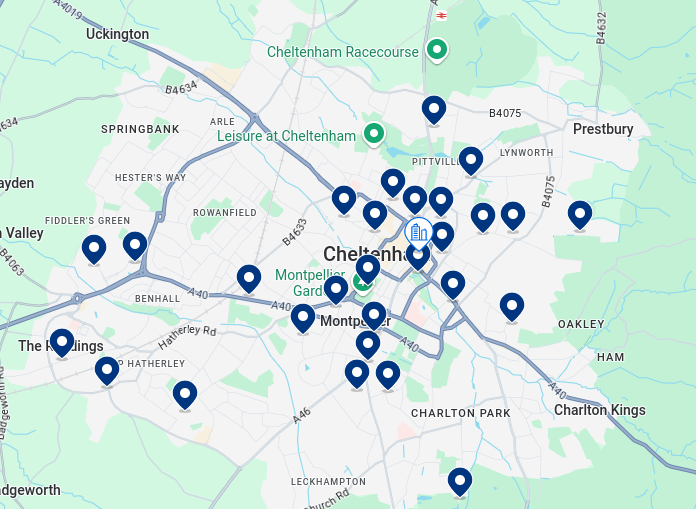The Airbnb Squeeze: How Short-Term Rentals are Pricing Out Cheltenham's Residents

Cheltenham, a picturesque town in southwest England, has long been a popular tourist destination. However, the rise of short-term rental platforms like Airbnb has put an increasing strain on the local housing market, pricing out many long-term residents.
A recent survey of Cheltenham residents has shed light on the problem. Of the respondents, a majority reported being directly impacted by nearby Airbnb properties. Complaints ranged from noise and safety concerns, pop-up brothels to the overall negative effect of increased traffic and parking on the character of their neighbourhoods.
"The Airbnb next to my home has caused untold misery and made me want to move!" lamented one frustrated resident.
The root of the issue lies in the large number of whole properties - indicated by more than 700 current listings Airbnb and booking.com - that have been converted from residential use to short-term vacation rentals. These are not simply spare rooms or garden buildings, but full one and two-bedroom homes and flats that have been removed from the long-term rental market.
This reduction in available housing stock, coupled with already high demand in Cheltenham, has put upward pressure on rents. Several respondents noted that rents for comparable properties are now significantly higher than their own mortgage payments, pricing out lower-income families and key workers. Average rents have increased 10% year on year to over £1300. But at £150 a night, a short term let can scoop over £5000 a month.
At other times these residential properties stand empty while hundreds of families are forced into temporary accommodation funded by hard pressed Cheltenham residents through council tax.
"Rent prices are very expensive in the United Kingdom - it should go down. Half of the salary goes to the rent money and it's very difficult for everyone," commented one survey participant.
The impact extends beyond just housing affordability. Residents also worry about the erosion of community as homes are transformed into impersonal short-term accommodations, with a constant churn of visitors. Safety concerns have also been raised, with one person reporting issues like a "pop-up brothel" operating out of a nearby Airbnb.
So what can be done? Many respondents believe the answer lies in proper regulation and taxation of the short-term rental market, bringing it in line with rules governing traditional hospitality businesses.
Top priorities identified in the survey include:
- Mandatory registration of all short-term rental properties
- Regular safety inspections to ensure compliance with health and fire codes
- Limits on the number of days per year a property can be rented out
- Proof that rental income is properly declared to tax authorities
"Airbnb should be restricted like it is being done in Amsterdam," suggested one resident, referring to that city's policies limiting short-term rentals.
Beyond regulatory measures, survey participants also called for increased investment in affordable housing to counteract the loss of units to the vacation rental market. And for those concerned citizens who want to influence policymakers, the message is clear: engage with your local councillors.
"This issue will influence my vote at the next local election," stated several respondents, underscoring the political salience of the Airbnb debate.
If lobbying elected officials proves ineffective, some respondents are even willing to go a step further, saying they would support independent candidates who champion pro-tenant policies.
If the lobbying of the councillors doesn't work, we can point out that our votes - we will be voting for candidates who will implement pro-tenant policies. And if there is no mainstream candidate, we will stand ourselves and we'll support each other to do that.
A small number of respondents expressed the view that short-term rentals like Airbnbs are a positive and that regulation is unwarranted. Their tone was notably dismissive of concerns raised by other community members.
One individual stated bluntly, "It's none of the council's business" when it comes to Airbnbs. Another respondent felt that "the future of holiday letting is Airbnb and people should really mind their own business."
These pro-Airbnb comments give the impression that the authors are primarily focused on maximising their own profits from short-term rentals, with little regard for the wider impact on the local housing market and community. There is a distinct lack of empathy or sense of shared responsibility expressed.
One respondent even went so far as to claim that student housing is a "far bigger problem" than Airbnbs, deflecting from the clear issues raised by many of their neighbours. This suggests a perspective that prioritises the interests of Airbnb hosts over the wellbeing of the broader community.
Overall, the pro-Airbnb responses demonstrate a fundamentally different mindset compared to those concerned about the negative effects of short-term rentals. Rather than seeing themselves as part of the Cheltenham community, these hosts appear to view the town as simply a source of revenue, disregarding the consequences for their fellow residents.
The Airbnb surge in Cheltenham is symptomatic of a broader challenge facing tourist hubs and residential areas alike. As platforms for short-term rentals continue to proliferate, local communities must grapple with balancing the economic benefits of tourism with the needs of permanent residents.
Cheltenham's residents have made clear that they want action - whether through tighter regulations, expanded affordable housing, or the ballot box.
Now tell us your thoughts https://forms.gle/utv2YKRBZYLQ8gEW8